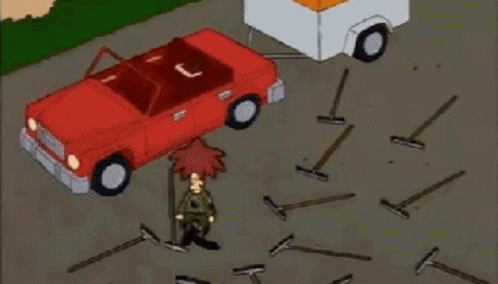If you’ve been around the internet lately, you’ll surely know that out there there is a plethora of gurus with their own perfect recipe for success. Tune out distractions, don’t watch tv nor waste your time consuming media, work out because you’re not successful if you’re not healthy. Learn to say no to good old social life (yes, even the face to face one) if it threatens to get in the way of your own pursuit.
Aside from a lot of doubts about whether there actually is a surefire way to be successful that works for everybody 100% of the time, there is one piece of advice that has always puzzled me. It’s the idea that you must only focus on one thing, and consider everything else as a distraction. As someone who has a hard time to decide what is it I want to do with my life, I’ve always considered it as a personal attack.
Repeatedly banging my head against the wall
This didn’t prevent me from trying, though: I tried to focus to only one thing, be it writing, coding a videogame or a 3D graphics application, digital art with Blender or Photoshop, video editing, studying philosophy.
Needless to say, I had problems as soon as I had to decide what to focus on, and for a while I thought that there was something I was doing wrong, some part of me that I had to force to focus and let everything else go. “Creativity thrives in constrained spaces”, after all, and this is a quote I love and occasionally write on scrap of papers when I want to feel a little better about my super-busy schedule.
Every time I tried it, though, the same happened. I kicked it off with a lot of enthusiasm and commitment, being very good at zoning out for hours if nothing happens to take me out of my flow. I managed to focus on the tasks at such a level that quickly led me to stress as soon as something got in the way. I hyper-fixated on the same low-level task and quickly lost track of the big picture, spiralling down until I eventually lost my steam and was caught by the next project to focus on.
It felt like a scene from “Cape Feare”, my favorite “The Simpsons” episode ever. The one where Sideshow Bob repeatedly steps on rakes while they hit him in the face.

Would you tell Leonardo Da Vinci he’s putting his eggs in too many baskets?
Luckily enough, right before I could begin to feel really bad about it, my brain began to ask the right question: “would you go and tell Leonardo Da Vinci that he’s putting his eggs in too many baskets?”
You see, back in the Renaissance era it was not that uncommon to see somebody with a vast knowledge in many fields, sometimes very different with respect to each other. Poetry, painting, maths, physics, philosophy… I don’t think anyone ever got to the Renaissance scientist to tell them they needed to focus on that single thing. And still they accomplished a lot, there’s no denying it.
A few years back I read a book about Edison and the story of how the lightbulb was invented. As much as I expected it to be a story of a lone genius which came up with an invention after years and years of experiments on his own, that wasn’t the case. Not at all.
What he did was found a sort of “co-working space” where people with all sorts of backgrounds worked on their own project in the same space with everyone else. Edison was convinced that innovation happened when different people brought their own contribution to the table. Given the results, I’d say he was right.
Sure, the people participating in this exchange had to be knowledgeable in their own field of expertise, but that on its own wouldn’t have allowed them to reach that breakthrough.
A more compelling reason to broaden your horizons
Sure, I’m neither a Leonardo Da Vinci nor an Edison, not even close. Someone can say that they’re very special cases, that their story is not how it works for common folks nowadays. But there is another reason to keep an open mind, a more compelling one in my opinion.
The thought hit me as I’m currently reading “The Filter Bubble” by Eli Parisier. Albeit quite old for modern standards (it’s from 2011), it’s still relevant in how it describes the continuous and unescapable personalisation we’re subjected to. That book will probably deserve its own post, either here or on Medium, but there is a concept I’ve already taken away while reading it, and it’s a concerning one.
All this personalisation, this specialisation is taking away our capability as humans to “connect the dots”, to draw links between distant concepts. That ability to connect two apparently unrelated ideas in a way that enhances both of them, or creates something new. We’ve been practicing it for centuries, but as we become more and more stuck in our own personal bubble we get less and less different perspectives And in the long run, it will become a problem and will get in the way of our creativity and maybe even survival.
Conclusion
It’s not my place to tell people that they don’t need to focus on a single pursue. Some people want to become really good at that something, and this is fine I guess. The problem arises when some self-proclaimed guru tells millions of people that hyper-specialisation is the only way to get good at something.
Every single one of us is made in their own way, and there is no right or wrong way to pursue a hobby, a passion or a side hustle.
Be First to Comment